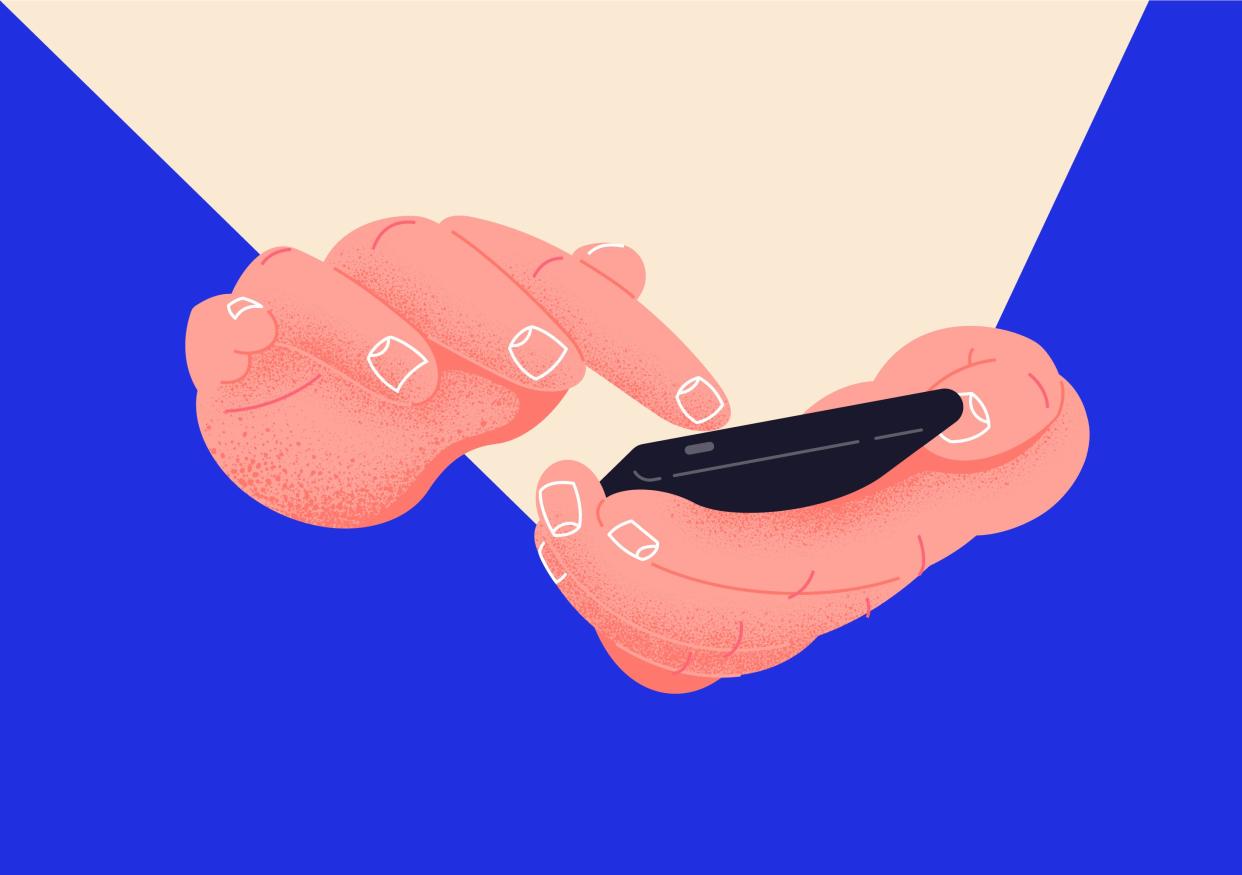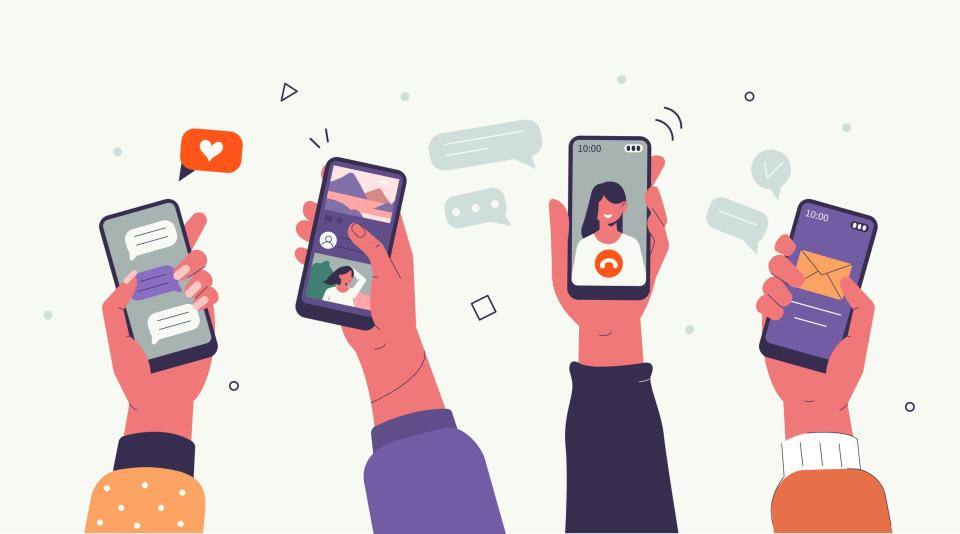Why do we ‘hate-follow’ people on social media?

Laura Johnson, 28, is scrolling through Instagram. As she idly flicks through the grinning faces and pouted lips looking out at her from the feed, she lands on the post of an influencer she dislikes. Laura clicks through to the profile. “I used to like her, but now I find her really annoying,” she admits. “I could unfollow her, but it’s become a habit to check her feed.” Laura also admits to screenshotting some of the influencer’s more cringe-worthy posts for the amusement of her group chat.
Laura is one of an increasing number of us who admit to ‘hate following’ – looking at and engaging with the online content of someone despite having feelings of ill-will or dislike towards them. It’s not just reserved for those in the public eye, or influencers guilty of jetting off to Dubai mid-pandemic. Even us laypeople people may find our socialmedia accounts being watched by secret frenemies.
Content creator Thomas Ling, 29, reveals he’s found himself hate following former friends and disliked colleagues every time he winds up on social media. “It’s therapeutic while I’m doing it – my go-to procrastination activity,” he says. “But I never feel good afterwards.”
Both Laura and Thomas admit that this behaviour stems partly from jealousy. “I want to say I relish the schadenfreude of seeing somebody unpleasant do badly, but it’s more successful people I’m obsessed with – the better off somebody I hate is doing, the more I’m drawn to them,” Thomas explains.
According to psychotherapist Sally Baker, we get a buzz from this curious behaviour, because the emotions of hate and love in the brain are inextricably linked. “The brain, fundamentally, does not differentiate between them,” she explains. “When we pay intense attention to a subject, it triggers the release of oxytocin, serotonin and dopamine. The feel-good hormones are released when you are emotionally involved with someone – regardless of the motivation, and results in this enflamed, emotional response.”
A 2008 study into human behaviour by Professor Semir Zeki confirms that the same nervous circuits in the brain that are activated in relation to hate are also triggered when an individual is in love, which goes a way to explaining the obsessive behaviours some hate followers tend to develop.
This negative cycle may have been more appealing in lockdown, as we found ourselves suddenly locked in our homes with only our screens for company. According to a GlobalWebIndex survey, July 2020 saw a rise of 10.5 per cent in social media usage, compared with July 2019 - with some 46 per cent of women and 41 per cent of men saying they’ve spent more time on social media during the pandemic.
As well as becoming an indispensable form of long distance communication, social media became a primary source of entertainment during lockdown – as exemplified by the sudden popularity in TikTok last year (the app was downloaded 315 million times in the first quarter of 2020). Idle scrolling was how many of us disconnected from our everyday routine and passed the time.
Grace Brazier, 26, found herself on her phone far more than usual during the first lockdown. Like Laura, she found herself secretly relishing seeing ex-friends and boyfriends having a difficult time. She admits the schadenfreude of it all even saw her hooked to her phone some days. “People started sharing so much of their life online,” she says. “I started checking to see who got dumped, or who went bald – I became obsessive. Seeing people I hadn’t got on with having a crap time of it was a little ego-boost to me.”
But as lockdown dragged on and Grace was furloughed from her job in interior design, she found her approach to social media change direction. “I started looking up former classmates who I knew lived really plush lives. At first it was just curiosity, then it became full hate following,” she tells me. One girl I went to school with is an up-and-coming actress – she landed a major role in a hit TV show during lockdown. I found myself seething with jealousy, checking her Instagram daily for updates and insight into her amazing life, even though I always felt worse afterwards. Suddenly I felt really inferior next to her.”
Digital marketing strategist Charlotte Sheridan compares this approach to the “keeping up with the Joneses’” mentality. “Before social media, that meant what your neighbours think of you and making sure the outside of your home looked nice. Now the Joneses are almost everyone you’ve ever known, and it’s not the outside of your house, it’s every single aspect of your life – how you parent, what you wear, whether you are ‘making memories,’” she says.
And while most of us want to present our best face to the world, social media has magnified this pressure to keep up. “They say comparison is the thief of joy and that is even more true when it comes to social media,” Sheridan says.
You no longer have to buy a gossip magazine to see a figure you despise making a fool of themselves – you can simply pick up your phone
But while ‘hate following’ in the digital age is a relatively new phenomenon, the notion of people rubbernecking the lives of those they loathe long pre-dates social media, explains Dr Martin Farr, Senior Lecturer in Contemporary British History at Newcastle University.
“Newspapers, then radio, then television, then the internet, made it possible for a person to have some sort of relationship with another person they didn’t know, and indeed would never meet. ‘Green-ink letters’ were well-known to public figures, and to the editors of newspaper letters pages, where the discarding of unhinged correspondence was a routine editorial process.
The difference now, Dr Farr says, is that far less effort is required for people to direct their hate at individuals now. You no longer have to go out to the shops and buy a gossip magazine to see a figure you despise making a fool of themselves – you can do that by simply picking up your phone.
“In the 21st century, you can keep a watchful eye on people in a love-to-hate way, silently participating in this act and rejoicing in whatever aspect it is about them that you dislike, with no consequences or repercussions whatsoever. It makes hate following an extremely desirable, and very easy, outlet.”

And with social media algorithms favouring posts that illicit a passionate or emotional response, if the person you hate follow is a public figure who relishes in the narcissistic dopamine hit of sharing deliberately provocative content, your follows can serve to encourage their behaviour further, explains Dr Farr. “Debates have become increasingly polarised. ‘Hate’ has long been a lubricant for the less scrupulous public figures, escalating matters with inflammatory or provocative posts increase their prominence and being able to luxuriate in others’ hate.”
However, before you start to purge your Instagram and Twitter feeds of those you guiltily follow just to mock, even just to show your friends, Dr Farr insists that hate following can also have its benefits. “I think it’s desirable to be presented with opinions and positions one may not agree with,” he says. “It’s a corrective to the ‘echo chamber’ and confirmation bias that social media can lead to, and which can allow for misinformation and fake news to proliferate. Different opinions exist, and one needs to be aware of them, rather than pretend – or wish – that they don’t.”
Baker agrees that hate following isn’t necessarily bad, or even unhealthy – it is perfectly human to compare ourselves to those around us. But she warns, we should be conscious of how much we do it. It’s when it becomes an obsessive, compulsive behaviour that you ruminate on continuously, aiming all your hatred and negativity on just a few individuals, that it becomes problematic.
It’s easier to hate something abstract, like a person you used to know than to recognise there’s an absence, or a problem in yourself
Dr Sally Baker
“Hate following is a fairly normal and understandable behaviour, within limits,” she says. “But there’s a difference between someone who can look at someone briefly, feel smug and then focus their minds on different aspects of their life, and someone who spends whole days just trawling social channels as an outlet for a number of emotions.”
Doing so could speak to deeper problems within ourselves. “It’s easier to hate something abstract, like a person you used to know than to recognise there’s an absence, or a problem in yourself,” Baker says. “If you find yourself hate-following in this masochistic, indulgent way, it speaks volumes about your sense of worth. It amplifies those negative thoughts in your head and those judgements you’re making about yourself.”
Social media may have become a solace for many as we were trapped inside, separated from friends and family during the worst crisis we’ve known in a lifetime, but it also provided us with new time which many filled by scrolling through Instagram and Twitter comparing their lives with those of others to quell the boredom. And it seems that the line between observing someone online with whom we might not necessarily relate and hate following them, is a fine one.
Sometimes, says Barker, the only thing we can do is to step away. “You have to be able to put your phone down, get up and walk away. The opposite of hate following isn’t love following, it’s total indifference.”
Read More
Social distancing and masks here to stay, Raab hints
Who is on the Facebook oversight board and who have they banned

